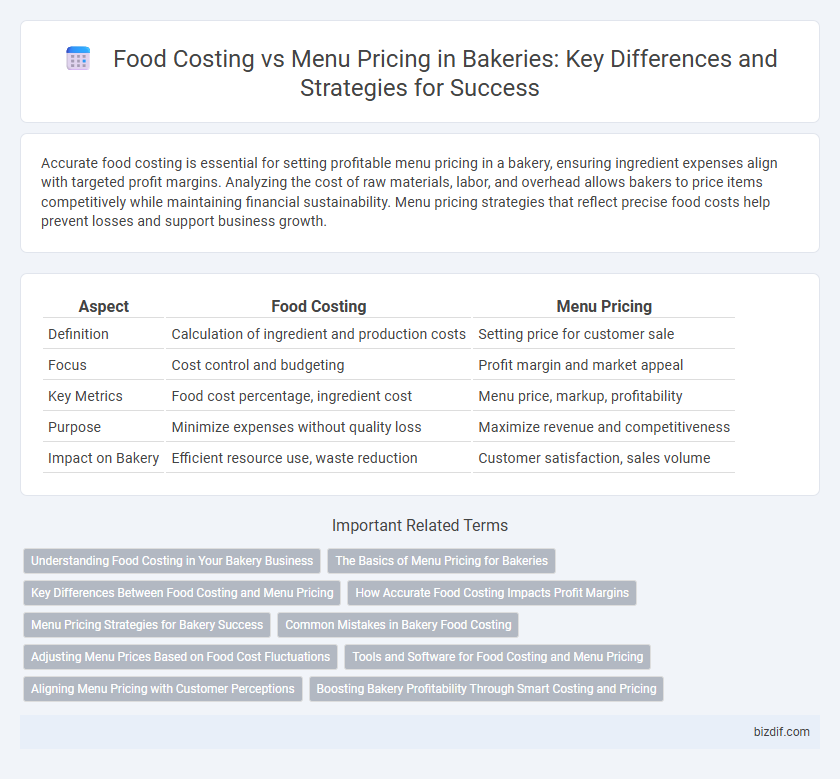Accurate food costing is essential for setting profitable menu pricing in a bakery, ensuring ingredient expenses align with targeted profit margins. Analyzing the cost of raw materials, labor, and overhead allows bakers to price items competitively while maintaining financial sustainability. Menu pricing strategies that reflect precise food costs help prevent losses and support business growth.
Table of Comparison
| Aspect | Food Costing | Menu Pricing |
|---|---|---|
| Definition | Calculation of ingredient and production costs | Setting price for customer sale |
| Focus | Cost control and budgeting | Profit margin and market appeal |
| Key Metrics | Food cost percentage, ingredient cost | Menu price, markup, profitability |
| Purpose | Minimize expenses without quality loss | Maximize revenue and competitiveness |
| Impact on Bakery | Efficient resource use, waste reduction | Customer satisfaction, sales volume |
Understanding Food Costing in Your Bakery Business
Understanding food costing in your bakery business involves calculating the total expense of ingredients and production for each baked item, ensuring precise budget management. Accurate food cost analysis helps optimize pricing strategies, maintain profitability, and minimize waste by tracking ingredient usage and supplier pricing fluctuations. Implementing a consistent food costing system supports informed decision-making and enhances overall financial health in your bakery operations.
The Basics of Menu Pricing for Bakeries
Menu pricing for bakeries hinges on accurately calculating food costing, which involves determining the total ingredient expenses for each baked item to ensure profitability. Incorporating overhead costs and desired profit margins into these calculations helps set competitive yet sustainable prices. Strategic menu pricing balances ingredient quality, portion size, and market demand to optimize bakery revenue.
Key Differences Between Food Costing and Menu Pricing
Food costing involves calculating the exact expenses of raw ingredients and production for each bakery item, ensuring accurate profit margins. Menu pricing determines the final selling price by factoring in food costs, labor, overhead, and desired profit margins to maintain competitive yet profitable pricing. Understanding these distinctions helps bakeries optimize pricing strategies for sustained financial success.
How Accurate Food Costing Impacts Profit Margins
Accurate food costing is essential for determining precise menu pricing, directly influencing bakery profit margins by ensuring ingredients are accounted for without underpricing or overpricing products. Maintaining detailed records of ingredient costs, portion sizes, and waste helps bakers set competitive prices that cover expenses and maximize earnings. Failure to accurately calculate food costs can lead to diminished profitability or lost sales due to incorrectly priced bakery items.
Menu Pricing Strategies for Bakery Success
Effective menu pricing strategies for bakery success hinge on balancing ingredient costs with perceived customer value to maximize profit margins. Incorporating tiered pricing based on product complexity and popularity allows bakeries to optimize food costing without alienating price-sensitive customers. Regularly analyzing sales data and adjusting prices accordingly ensures sustainable growth while maintaining competitive advantage in a crowded market.
Common Mistakes in Bakery Food Costing
Common mistakes in bakery food costing include inaccurate ingredient measurements, leading to inconsistent portion sizes and profit loss. Failing to account for overhead expenses such as utilities and labor skews the true cost of baked goods. Overlooking waste and spoilage inflates food cost calculations and results in higher menu pricing errors.
Adjusting Menu Prices Based on Food Cost Fluctuations
Adjusting menu prices in a bakery requires careful monitoring of food cost fluctuations, including ingredient expenses such as flour, sugar, and dairy. Implementing dynamic pricing strategies based on real-time cost analysis ensures profit margins remain stable despite market volatility. Regularly updating menu prices according to supplier price changes and seasonal availability maintains both competitiveness and profitability.
Tools and Software for Food Costing and Menu Pricing
Food costing and menu pricing in a bakery benefit significantly from specialized tools and software like CostGuard, BakeSmart, and MenuCalc, which streamline ingredient cost tracking and recipe analysis. These platforms provide real-time data on raw material expenses, labor, and overhead, enabling precise menu pricing strategies that maximize profit margins. Integrating inventory management with automated cost calculation helps bakeries optimize pricing accuracy and adapt quickly to market fluctuations.
Aligning Menu Pricing with Customer Perceptions
Accurately aligning menu pricing with customer perceptions in bakery operations requires balancing food costing metrics and perceived value of products. Using data from ingredient costs, labor, and overhead combined with market research on customer willingness to pay ensures pricing strategies maximize profitability without alienating target customers. Optimized menu prices reflect both the true cost of baked goods and consumer expectations, driving sales and enhancing brand loyalty.
Boosting Bakery Profitability Through Smart Costing and Pricing
Effective food costing involves accurately calculating ingredient expenses and portion sizes, directly influencing menu pricing strategies to maximize bakery profitability. Implementing dynamic menu pricing based on precise food costs and market trends enables bakeries to maintain competitive pricing while ensuring healthy profit margins. Regular analysis of cost fluctuations and customer preferences allows for adjustments that boost revenue without compromising quality or customer satisfaction.
Food Costing vs Menu Pricing Infographic

 bizdif.com
bizdif.com